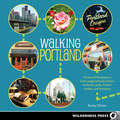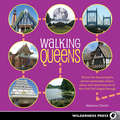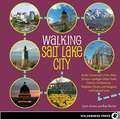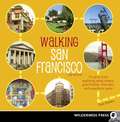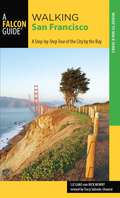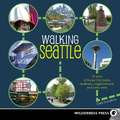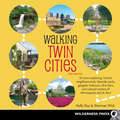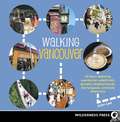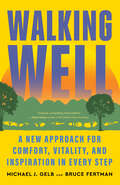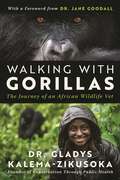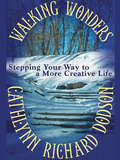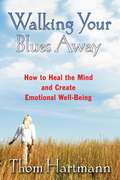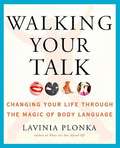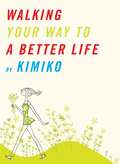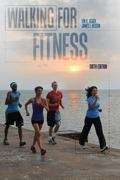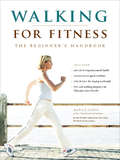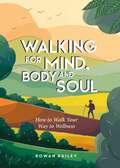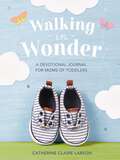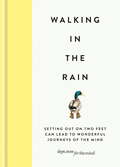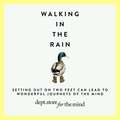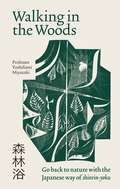- Table View
- List View
Walking Portland
by Becky OhlsenFrom a massive urban forest to the tiniest brewpub, Portland offers a huge variety of entertainments within a surprisingly compact area. Organic coffeeshops line the streets at the foot of an extinct volcano, and independent bookstores nestle up against food-cart pods. Already famous for its great beer, the city has become a center for serious dining on a reasonable budget. And thanks to years of progressive urban planning, Portland's layout makes it a walker's nirvana.In Walking Portland, devoted local Becky Ohlsen guides you through the Rose City's many charms, from idyllic waterfront fountains to the more obscure and out-of-the-way pockets of cool. On each walk, you'll discover hidden gardens, historic landmarks, award-winning restaurants, old-school taverns, oddball shops, and edgy warehouse galleries in some of the Northwest's most exciting neighborhoods. You'll cross bridges and graveyards, wander a Smithsonian-honored boulevard, see experiments in urban renewal (some inspiring, some dubious) and be regaled with stories of the city's colorful past. Whether you're looking for a leisurely stroll full of shopping and snacks or a vigorous trek over tree-covered hillsides, grab this book, step outside and . . . walk Portland.
Walking Queens
by Adrienne OnofriHome to more than 2.3 million people who speak at least 150 different languages, Queens is heralded as the most multicultural place on Earth. People go there to watch Major League Baseball or the U.S. Open. Perhaps they venture just across the river, to check out a trendy new restaurant, bar, or performance space in Long Island City or Astoria, or ride the train all the way out to the beach on a summer's day.Now, with Walking Queens by local author Adrienne Onofri, readers get to know the whole borough. Each walk tells the story of a neighborhood: how it developed originally and how it's transformed over the years. Readers are pointed to distinctive architecture, landmark buildings, popular eateries, ethnic enclaves, celebrity residences, art and performance spaces, and natural scenery. There are tours that reveal forgotten moments in Queens history, or position you for a stunning view, or immerse you in all the sights, scents, and sounds of a melting pot. Maps and transportation directions make it easy to find your way. Whether you're looking for an afternoon stroll or a daylong outing, grab this book and start walking Queens!
Walking Salt Lake City
by Ray Boren Lynn AraveA new title in the Walking series, Walking: Salt Lake City is geared to first-time visitors to Salt Lake City--and to local residents. Both will enjoy the history and tales about places they thought they knew, and will be surprised to find walking destinations they may not have considered before.Each tour in the stylish, portable format touches on history, culture, and local architecture, plus insider recommendations on eateries, galleries, and nightlife. With clear maps depicting each walk, parking and public transit info, at-a-glance summaries and Points of Interest appendices, there's no better way to discover a city than on foot with a Walking guide.Walking Salt Lake City is a time-traveling guide to Salt Lake City's past and to its vibrant present. Written by Utah natives, it presents rambles of every kind. The 30+ tours explore the city's downtown, which is experiencing an invigorating renaissance; Temple Square, world headquarters of the Latter-Day Saints Church; Capitol Hill; character-filled neighborhoods like the Avenues and "15th and 15th"; and semi-rural surprises near and within the bustling city, from Memory Grove and City Creek Canyon, a stone's throw from metropolitan skyscrapers, to tucked-away and nearly forgotten Miller Bird Preserve and the appropriately named Hidden Hollow.While snow-capped mountains, famous canyon resorts, and the inland sea that gave the city its name invitingly beckon hikers, skiers, snowboarders, climbers, and day-trippers, Walking Salt Lake City unveils tempting reasons to enjoy the urban setting itself. Thoughtfully designed, the guide offers precise directions, easy to follow summaries, and tips about inviting eateries and shopping havens. Whether you are out for a heart-pumping workout or an evening stroll, filling an hour or a day, or count yourself a Utah visitor, a new resident or a lifelong local, this book is designed with you in mind.
Walking San Francisco
by Tom DownsFrom the Gold Rush to the Summer of Love to the dotcom days, San Francisco has been a city of distinct neighborhoods. This savvy, entertaining guide explores the best of the city "on the ground" in tours that traverse its length and breadth. The 33 urban treks are a great way to soak up the history, culture, and vibe of the City by the Bay. The walk's commentary includes trivia about architecture, local culture, and neighborhood history, plus tips on where to dine, have a drink, or shop. Each tour includes a clear neighborhood map and vital public transportation and parking information. Route summaries make each walk easy to follow, and a Points of Interest section lists each walk's highlights. Walking San Francisco provides the perfect path for a weekend adventure, an after-work ramble, or a sociable pub crawl.
Walking San Francisco (Walking Guides Series)
by Tracy SalcedoSan Francisco is one of America's most walkable cities, and this book describes 18 walks that can be taken by the casual visitor, including 9 in the Golden Gate National Recreation Area, the world's largest urban national park. This compact guidebook will walk you through the best San Francisco has to offer. If you're planning to visit San Francisco--or explore your hometown--you'll be sure you're on the right track with this guidebook.
Walking Seattle
by Clark HumphreyThe Queen City of the Pacific Northwest was once known principally for the spectacular forests, mountains, and waters surrounding it.But now, what's in Seattle is as famous as what's outside it. This is a vibrant young city full of attractions. It's a center for several hi-tech industries and a crossroads of global cultures.Seattle is also one of the most walkable cities in the country. It's full of cozy bungalows, stately mansions, postmodern palaces, and outdoor art all over. It has wide boulevards, narrow cobblestone lanes, and carless pedestrian pathways.Walking Seattle reveals 35 specially designed urban treks that are not only good exercise but are a great way to soak up the city's history, culture, parks, and vibe.Commentary includes trivia about architecture, local culture, and neighborhood history, plus tips on where to dine, have a drink, or shop.Each tour includes a neighborhood map and vital public transportation and parking information.Route summaries make each walk easy to follow, and a "Points of Interest" section lists each walk's highlights.Local insider Clark Humphrey leads you from Greenwood to Rainier Beach, from Green Lake to Fauntleroy, and many places in between.Walking Seattle. Get it, and get moving.
Walking Twin Cities
by Holly Day Sherman WickEven though they're often lumped together, the Twin Cities are two distinct cities with very different histories. Minneapolis is the Mill City, the City of Lakes, composed mostly of flat prairies. St. Paul is the Capital City, built on rolling hills and high river bluffs.Culturally, the cities have their differences, too. Minneapolis is home to world-renowned theatres and modern art galleries, while St. Paul is the home of many of the state's institutions, from the seat of government to the seat of the Roman Catholic Archdiocese of St. Paul and Minneapolis. Minneapolis is a newer city, which is reflected in the architecture and overall vibe, while St. Paul's older neighborhoods feature some of the most intact Victorian-era houses in the country. Because of their locations on the west and east sides of the Mississippi River, critics say that Minneapolis is more like a modern West Coast city, while St. Paul is akin to a historic East Coast city.Both cities are linked by the Mississippi River-the same force that shaped their origins. St. Paul developed earlier, mostly because it was more easily accessible via the river. Another similarity between the two cities is the foresight by the Victorians who succeeded the cities' founders to invest money into their communities-both cities set aside large tracts of land for public use all along the rivers and lakes. Some of the most beautiful parks were plotted in the early days of the cities.Even today there are big differences between the cities. For example, St. Paulites, gluttons for punishment, host the annual Winter Carnival during the coldest time of the year. Minneapolitans take the easy way out by celebrating the Aquatennial Festival each summer. Despite having their city festivals at opposite ends of the solstice, Minnesotans love the outdoors. Even with the notoriously fierce winters, Minnesotans statistically spend more time outside than most.Whether you're interested in art, culture, history, or nature, there's a walk in this book designed for your interests. We hope that it serves not only as a guidebook for (re)discovering the Twin Cities, but as a springboard for additional explorations.This book contains 35 walks of varying levels of difficulty, built around the natural, architectural, and historical attractions of Minneapolis and St. Paul. The downtown areas of both cities are explored in depth, as well as many of the neighborhoods, scenic parks, and lakes that are scattered through the area.
Walking Vancouver
by John LeeThere's no better way to explore one of the world's most livable cities than on foot. Walking Vancouver shows you Vancouver, British Columbia as you've never seen it before, whether you're a die-hard local or a first-time visitor. Site of the 2010 Winter Olympics, the city is already renown for its diverse neighborhoods, easily accessible sites, and "clean and green" image.With this book you'll explore neighborhoods such as Chinatown, Kitsilano, and the West End, accompanied by the amusing and savvy descriptions from the author, a Vancouver insider. The 36 anecdote-packed, easy-to-follow ambles include Stanley Park's hidden sites; University of British Columbia's unexpected attractions; Granville Island's artisan pit stops; and the historic mansions of old-school Shaughnessy Heights. There's a perfect pub crawl in Gastown; lively farther afield strolls in Steveston, New Westminster and the North Shore; and even an eye-opening tour around the Downtown Eastside. You'll uncover the colorful stories behind street names, character buildings, and eye-catching public art. This highly portable guide features detailed maps for each trip, original photos, and parking/transit information for every trip. Route summaries make each walk easy to follow, and a "Points of Interest" section summarizes each walk's highlights.
Walking Well: A New Approach for Comfort, Vitality, and Inspiration in Every Step
by Michael J. Gelb Bruce Fertman“You wouldn’t think that you need experts to tell you if and how walking is good for you, but we were surprised at how full of contemplative practices and vision these 200 pages were.” — A Spirituality & Practice Best Spiritual Book of 2024 Walking is good for you. It can regulate weight, improve sleep, elevate mood, transform stress, and boost creativity. Most people want to walk more. But what if the key isn’t just to walk more, but to walk better? Walking Well presents a three-part journey that will guide you to discover more comfort, vitality, and inspiration in every step. Filled with simple, practical guidance from authors with over a hundred years of collective experience in teaching people how to move well, this book not only improves how we walk but reveals how much is possible for us once we know how to walk well.
Walking With Gorillas: The Journey of an African Wildlife Vet
by Dr. Gladys Kalema-ZikusokaAn Inspiring Memoir, for Fans of Jane Goodall, Dian Fossey, and Frans De Waal. In her enchanting memoir, Dr. Gladys Kalema-Zikusoka, Uganda&’s first wildlife veterinarian, tells the remarkable story from her animal-loving childhood to her career protecting endangered mountain gorillas and other wild animals. She is also the defender of people as a groundbreaking promoter of human public health and an advocate for revolutionary integrated approaches to saving our planet. In an increasingly interconnected world, animal and human health alike depend on sustainable solutions and Dr. Gladys has developed an innovative approach to conservation among the endangered Mountain Gorillas of Bwindi Impenetrable Forest and their human neighbors.Walking with Gorillas takes the reader on an incredible personal journey with Dr. Gladys, from her early days as a student in Uganda, enduring the assassination of her father during a military coup, to her veterinarian education in England to establishing the first veterinary department for the Ugandan government to founding one of the first organizations in the world that enables people to coexist with wildlife through improving the health and wellbeing of both. Her award-winning approach reduced the impact of the COVID-19 pandemic on critically endangered mountain gorillas. In the face of discrimination and a male dominated world, one woman&’s passion and determination to build a brighter future for the local wildlife and human community offers inspiration and insights into what is truly possible for our planet when we come together.
Walking Wonders
by Cathlynn Richard DodsonA guide to finding joy and relaxation through the practice of taking a daily walk.
Walking Your Blues Away: How to Heal the Mind and Create Emotional Well-Being
by Thom HartmannA new approach to using walking to heal emotional trauma and bring forth optimal mental functioning • Explores why and how we carry emotional wounds, and how they can be healed and resolved • Shows how walking stimulates both sides of the brain to promote and restore mental health • Provides simple, yet potent, mental exercises to use while walking Our bodies usually heal rapidly from an illness, injury, or wound. Yet our minds and hearts often suffer for years with debilitating symptoms of distress or upset. Why is it so hard for our minds and hearts to heal? The key to healing them is simple and can be just a short walk away.Walking--a bilateral therapy that has been a part of human life throughout history--allows people to heal emotionally as quickly as they do physically. Bilateral therapies engage both sides of the brain and unlock natural states of optimal function and creativity. Thom Hartmann examines how memory works and why emotional shock can resist normal healing. He found that the simple act of walking is effective in treating emotional disturbances ranging from temporary upsets and problems to chronic conditions such as post-traumatic stress disorder and depression. Case studies have shown dramatic results. Walking consciously, while holding a distress or desire in mind, can rapidly dissolve the rigidity of a traumatic memory or negative mind state, dispersing its unpleasant associations in as little as a half hour’s time. While walking has always been a natural part of life, its importance in promoting and maintaining mental health is only recently being rediscovered. Hartmann’s simple yet potent exercises allow us to create our own walking journeys to restore our mental, emotional, and spiritual well-being as well as rejuvenate our body’s health.
Walking Your Talk
by Lavinia PlonkaIn every movement of our bodies, we express a world of emotions. But our movements don't just reflect our emotions-they directly affect them. In Walking Your Talk, Lavinia Plonka explores the connection between how we move and how we feel. Our movements and body posture are more than just simple expressions of our feelings-they are a powerful factor in our well-being. And changing them can be a crucial first step in altering our emotional behaviors. Drawing from her years of experience as a movement teacher and Feldenkrais Method(r) instructor, Plonka provides simple exercises, thought-provoking lessons, and real-life examples that help readers better understand the relationship between their movement patterns and their emotional state. After beginning with an overview of both historical and modern ideas about the correlation between bodily movement and human emotion and expression, Plonka turns theory into practice by addressing each major area of the body-and the emotional baggage held there. Through exploratory exercises, we learn more about: - how we carry stress-from responsibilities, family issues, and financial burdens-in our shoulders; - why we "freeze" the pelvis-the bodily center of personal freedom, power, spontaneity, and sexuality; and - the self-confidence (or lack thereof) we convey through our carriage. Whether she is examining how a depressed chest can make us feel psychologically depressed, how body language is used to deceive others, or how loosening our pelvis can help us break a lifelong cycle of self-destructive behavior, Plonka is always caring and insightful, guiding readers to a deeper awareness of themselves and how changing their posture has the potential to change their whole lives. .
Walking Your Way to a Better Life
by KimikoAuthor KIMIKO was a fulltime housewife and mother of two children who at the age of 36 discovered the mental and physical benefits of walking properly. Born and raised in Okayama--a prefecture west of Osaka--she attended an all-girls high school and was later hired by the Tokyo office of a cosmetics company. At the age of 27, she took the recommendations of a customer and met a financially secure man of 32 who was being groomed to take over his family's business. Falling prey to her friends' urgings to "marry a rich man" and her own ideas of equating marriage with stability, she got married soon thereafter. Though her husband was faithful, kind, and hardworking, and she provided office work for the family business, she found her marriage wanting until she realized one day that she "had nothing for herself in her life." She felt her "sense of self slipping away." It was then that she decided to take a walking class. Within two years Kimiko was teaching walking herself, refining the lessons she'd learned in other walking classes and applying life-affirming lessons to her process. Though the basics of proper walking technique and posture are outlined, the extension of spiritual growth and reaffirmation methods from applying them supply the body of the text. Some of the lessons KIMIKO discusses include:· Turning on the Positive Switch--Complimenting yourself throughout the day can elevate your confidence and spirit in everything you do· Discovering the Beauty Within You--Making a list of 100 aspects of your worthiness will help reverse the inner feelings of self-loathing and strengthen self-esteem· Make Yourself a High-Class Brand--Learning and applying the proper posture gained through walking will present an air of confidence and good looks that no amount of brand fashions and make-up can rival· How to Be Treated Preciously by Others--Don't short-change those things to which you treat yourself, otherwise others will shortchange you· Walking Effectively to Activate Your Positive Switch--The simple act of walking properly--head up, weight back, rolling your foot forward heal-to-toe--will cause a spiritual shift
Walking for Fitness (Sixth Edition)
by James L. Hesson Lon H. SeigerWalking for Fitness focuses on the components of health-related fitness that are of greatest concern in our society—cardiovascular fitness and body composition. This book is designed to educate and motivate you to adopt fitness walking and other positive behaviors as part of an active, healthy lifestyle.
Walking for Fitness: The Beginner's Handbook
by Marnie Caron&“This book is a step-by-step guide to get you started and offers good advice on everything from the right shoes and diet to staying motivated.&” —Good Times Magazine Includes tips and walking programs by Olympian Lynn Kanuka Walking is the most popular physical activity in North America, and for good reason: it can be done by people of all ages and all levels of physical ability, the risk of injury is low, and it doesn&’t require a carload of expensive equipment. Best of all, brisk walking for just 30 minutes four times a week reduces the risk of heart disease, diabetes, obesity, osteoporosis, and other health problems. This comprehensive guide helps readers make the most of their walking. It offers two step-by-step programs developed by fitness professionals; advice on shoes, clothing, nutrition, and routes; tips on staying motivated and avoiding injury; stories from real-life walkers; and ways to include friends and family. Whether the goal is to return to activity, reduce the risk of illness and injury, or to minimize one&’s impact on the environment, this encouraging book helps readers put their best foot forward. &“Caron covers everything including the various health benefits, warming up and cooling down, and the right kinds of clothing and shoes. There&’s a list of reminders on how to incorporate walking into my daily routine . . . and a number of walker profiles. The profiles can be motivational and illustrate the reasons people have for walking and how it can be an important part of keeping fit.&” —Toronto Star
Walking for Mind, Body and Soul: How to Walk Your Way to Wellness
by Rowan BaileyGuiding you through the physical, spiritual and sensory benefits of walking, these pages will help you reap the therapeutic wonders of putting one foot in front of the other. Bursting with practical tips, insightful information and inspirational ideas, this book is your companion to crafting a life of balance and bliss with every step.
Walking for Mind, Body and Soul: How to Walk Your Way to Wellness
by Rowan BaileyGuiding you through the physical, spiritual and sensory benefits of walking, these pages will help you reap the therapeutic wonders of putting one foot in front of the other. Bursting with practical tips, insightful information and inspirational ideas, this book is your companion to crafting a life of balance and bliss with every step.
Walking in Wonder: A Devotional Journal for Moms of Toddlers (12-24 Months) – A Memory Book for Your Child’s Second Year, with 144 Devotions
by Catherine Claire LarsonReceive God's peace and grace during the intense and joy-filled toddler year and create memories for a lifetime as you journal prayers and love notes for your toddler.Embrace the independent and energetic toddler year with this weekly devotional journal—a keepsake memory book created with your spiritual growth in mind as you watch your child grow day by day.In this beautiful companion to Waiting in Wonder and Watching in Wonder, popular blogger Catherine Claire Larson encourages moms to receive God's peace and grace during the intense and joy-filled toddler year.Designed to help you discover God's love in a new way as your little one discovers their world, Walking in Wonder includes:Three Scripture-based devotions each week centered on spiritual and parenting themes such as resting, feeding, and speakingMonthly "Memories and Milestones" sections to document your toddler's growthThoughtful journaling prompts with space to record stories and prayers during this busy and delightful year With its invitation to draw near to God as you navigate your child's second year of life, this is a unique and thoughtful gift for adoption parties, birthday celebrations, or simply for yourself and future generations.Savor the transformation happening in your faith life as you enjoy the remarkable changes in your toddler.
Walking in the Rain
by Dept LtdGetting lost and feeling found...'I only went out for a walk and finally concluded to stay out till sundown, for going out, I found, was really going in.' - John Muir, John of the MountainsWalking is medicine for the mind. It helps us slow down and think things through. It also helps us perk up and generate new ideas. There are few activities as readily available and revitalizing as a brisk walk, or as soothing and stimulating as a long walk. Wonderful things can happen when we set out on two feet.Within these pages, you will find stories from artists, designers, writers, psychologists and speakers who are inspired by the effect of pacing outdoors. You will hear of walks in the city, hikes through woods at dawn and epic adventures involving long journeys on foot. No matter the scale of the tale, the writer offers lessons they learned of a simple, human nature that we can all understand.In each chapter you will discover suggestions and ideas about how to create simple daily habits from the writer's thinking. In a world where so much of the noise around us suggests we are not good enough as we are, and that we must seek to change, these accounts try to do something different. They aim instead to invite a stroll into the complex pathways of the mind to discover the beauty of our own quirky individuality.
Walking in the Rain: Discover mindfulness on the go
by Department Store for the MindGetting lost and feeling found...'I only went out for a walk and finally concluded to stay out till sundown, for going out, I found, was really going in.' - John Muir, John of the MountainsWalking is medicine for the mind. It helps us slow down and think things through. It also helps us perk up and generate new ideas. There are few activities as readily available and revitalizing as a brisk walk, or as soothing and stimulating as a long walk. Wonderful things can happen when we set out on two feet.Within these pages, you will find stories from artists, designers, writers, psychologists and speakers who are inspired by the effect of pacing outdoors. You will hear of walks in the city, hikes through woods at dawn and epic adventures involving long journeys on foot. No matter the scale of the tale, the writer offers lessons they learned of a simple, human nature that we can all understand.In each chapter you will discover suggestions and ideas about how to create simple daily habits from the writer's thinking. In a world where so much of the noise around us suggests we are not good enough as we are, and that we must seek to change, these accounts try to do something different. They aim instead to invite a stroll into the complex pathways of the mind to discover the beauty of our own quirky individuality.
Walking in the Rain: Discover mindfulness on the go
by Dept LtdGetting lost and feeling found...'I only went out for a walk and finally concluded to stay out till sundown, for going out, I found, was really going in.' - John Muir, John of the MountainsWalking is medicine for the mind. It helps us slow down and think things through. It also helps us perk up and generate new ideas. There are few activities as readily available and revitalizing as a brisk walk, or as soothing and stimulating as a long walk. Wonderful things can happen when we set out on two feet.Within these pages, you will find stories from artists, designers, writers, psychologists and speakers who are inspired by the effect of pacing outdoors. You will hear of walks in the city, hikes through woods at dawn and epic adventures involving long journeys on foot. No matter the scale of the tale, the writer offers lessons they learned of a simple, human nature that we can all understand.In each chapter you will discover suggestions and ideas about how to create simple daily habits from the writer's thinking. In a world where so much of the noise around us suggests we are not good enough as we are, and that we must seek to change, these accounts try to do something different. They aim instead to invite a stroll into the complex pathways of the mind to discover the beauty of our own quirky individuality.(p) Octopus Publishing Group 2017
Walking in the Rain: Discover mindfulness on the go
by Dept LtdGetting lost and feeling found...'I only went out for a walk and finally concluded to stay out till sundown, for going out, I found, was really going in.' - John Muir, John of the MountainsWalking is medicine for the mind. It helps us slow down and think things through. It also helps us perk up and generate new ideas. There are few activities as readily available and revitalizing as a brisk walk, or as soothing and stimulating as a long walk. Wonderful things can happen when we set out on two feet.Within these pages, you will find stories from artists, designers, writers, psychologists and speakers who are inspired by the effect of pacing outdoors. You will hear of walks in the city, hikes through woods at dawn and epic adventures involving long journeys on foot. No matter the scale of the tale, the writer offers lessons they learned of a simple, human nature that we can all understand.In each chapter you will discover suggestions and ideas about how to create simple daily habits from the writer's thinking. In a world where so much of the noise around us suggests we are not good enough as we are, and that we must seek to change, these accounts try to do something different. They aim instead to invite a stroll into the complex pathways of the mind to discover the beauty of our own quirky individuality.(p) Octopus Publishing Group 2017
Walking in the Woods: Go back to nature with the Japanese way of shinrin-yoku
by Yoshifumi Miyazaki'It is clear that our bodies still recognize nature as our home...' - Yoshifumi Miyazaki'Forest bathing' or shinrin-yoku is a way of walking in the woods that was developed in Japan in the 1980s. It brings together ancient ways and wisdom with cutting edge environmental health science. Simply put, forest bathing is the practice of walking slowly through the woods, in no hurry, for a morning, an afternoon or a day. It is a practice that involves all the senses and as you gently walk and breathe deeply, the essential oils of the trees are absorbed by your body and have an extraordinary effect on positive feelings, stress hormone levels, parasympathetic nervous activity, sympathetic nervous activity, blood pressure, heart rate and brain activity.In this wonderful book, by the leading expert in the field, science meets nature, as we are encouraged to bathe in the trees and become observers of both the environment around us and the goings on of our own minds.
